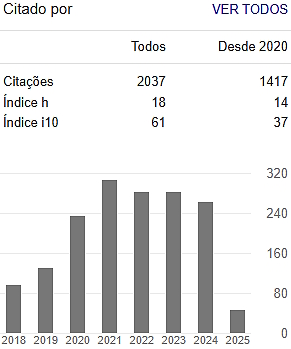Evidence of post-formed structures during systemic Curtobacterium flaccumfaciens pv. flaccumfaciens infection in resistant Phaseolus vulgaris genotypes
Keywords:
susceptibility, bacterial wilt, plant-pathogen interactionAbstract
Abstract
Bacterial wilt of the common bean caused by Curtobacterium flaccumfaciens pv. flaccumfaciens results in economic losses. The aim of this study was to analyze the colonization of C. flaccumfaciens pv. flaccumfaciens in resistant, moderately resistant, and susceptible genotypes of common bean plants. The genotypes Ouro Branco and IPA 9 (resistant), Diacol Calima (moderately resistant), and CNFRS 11997 and CNFP 10429 (susceptible) were inoculated in the epicotyl, with 100 µL of bacterial suspension of the BRM 14933(Cff25). Disease severity was evaluated 21 days after inoculation (DAI), on a scale from 1 to 9. The samples for SEM were dehydrated in an ethyl alcohol series, critical-point dried with liquid carbon dioxide (CO2), and coated with gold and analyzed using a scanning electron microscope. Ouro Branco and IPA 9 (resistant) plants exhibited low colonization, the formation of filaments surrounding bacterial cells and vestures more developed in the pit the xylem vessels. Diacol Calima (moderately resistant) plants presented lower levels of colonization and filament formation than that of resistant cultivars. CNFC 10429 and CNFRS 11997 (susceptible) showed high levels of colonization in the xylem and vessel obstruction, preventing water and nutrient flow, which explains the symptoms of wilt and plant death. Thus, resistance to C. flaccumfaciens pv. flaccumfaciens can be explained by plant’s capacity to limit pathogen propagation as a cell defense mechanism, suggesting that this is a factor in post-formed structural resistance that occurs in this pathosystem.
Keywords: susceptibility; bacterial wilt; plant-pathogen interaction.
Downloads
References
CALDWELL, D. & IYER-PASCUZZI, A. J. A. Scanning Electron Microscopy Technique for Viewing Plant−Microbe Interactions at Tissue and Cell-Type Resolution. Phytopathology, v.109. n.7, p. 1302-1311, 2019. https://doi.org/10.1094/PHYTO-07-18-0216-R
CONTRERAS N, TRUJILLO G, BORGES O, CENTENO, F. Análisis ultraestructural de la interacción de Xanthomonas axonopodis pv. phaseoli con genotipos resistentes, moderadamente resistentes y susceptibles de Phaseolus vulgaris L. Interciência v. 11, p. 554 – 57, 2001.
HARDING, M.; NADWORNY, P.; BUZIAK, B.; OMAR, A.; DANIELS, G. AND FENG, J. Improved methods for treatment of phytopathogenic bio- films: metallic compounds as anti-bacterial coatings and fungicide tank-mix partners. Molecules, v.24, 2312, 2019. https://doi.org/10.3390/molecules24122312
HARVESON, R.M.; SCHWARTZ, H.F.; URREA, C.A; AND YONTS, C.D. Bacterial wilt of dry-edible beans in the central high plains of the US: Past, present, and future. Plant Disease, v.99, n.12, 1665–1677, 2015. https://doi.org/10.1094/PDIS-03-15-0299-FE
HARVESON, R.M.; SCHWARTZ, H.F.; VIDAVER, A.K.; LAMBRECHT, P.A. AND OTTO, K.L. (2006) New outbreaks of bacterial wilt of dry bean in western Nebraska observed from field infections. Plant Disease, v.90, n.5 p.681, 2006. https://doi.org/10.1094/PD-90-0681A
HUANG, H. C.; ERICKSON, R.R.; BALASUBRAMANIAN, P.M.; HSIEH, T.F. and CONNER, R.L. Resurgence of bacterial wilt of common bean in North America. Canadian Journal of Plant Pathology, v.21, p.290-300, 2009. https://doi.org/10.1111/mpp.12926
MARINGONI, A. C.; ROSA, E. F. Ocorrência de Curtobacterium flaccumfaciens pv. flaccumfaciens em feijoeiro no Estado de São Paulo. Summa Phytopathologica, Jaboticabal, v. 23, p. 160-162, 1997.
MARINGONI, A.C. Comportamento de cultivares de feijoeiro comum à murcha-de-curtobacterium. Fitopatologia Brasileira, v. 27, n.2 p.157 – 162, 2002. http://dx.doi.org/10.1590/S0100-41582002000200006
MARINGONI, A.C.; ISHISZUKA, M.S.; SILVA, A.P. et al. Reaction and colonization of common bean genotypes by Curtobacterium flaccumfaciens pv. flaccumfaciens. Crop Breeding and Applied Biotechnology v. 15, n.12, p. 87 – 93, 2015. https://doi.org/10.1590/1984-70332015v15n2a16
MIRANDA, F. R.J. (2006) Perda de produtividade em feijoeiro comum cv. Pérola causada por Curtobacterium flaccumfaciens pv. flaccumfaciens. Dissertação (Mestrado em Fitopatologia) - Universidade de Brasília, Brasília, p. 79, 2006.
OSDAGHI, E.; YOUNG, A.J.; HARVESON, R.M. Bacterial wilt of dry beans caused by Curtobacterium flaccumfaciens pv. flaccumfaciens: A new threat from an old enemy. Molecular Plant Pathology, v.21, n.5, p. 605– 621, 2020. https://doi.org/10.1111/mpp.12926
PASCHOLATI, S.F.; LEITE, B. Hospedeiro: mecanismos de resistência. In: Bergamin Filho A, Kimati H, Amorim L, Eds. Manual de Fitopatologia. São Paulo, SP, BRASIL: Agronômica Ceres, 417 – 53, 2011.
RAVA, C. A.; COSTA, J. G. C. da. Reação de cultivares de feijoeiro comum à murcha-de-curtobacterium. In: REUNIÃO SUL-BRASILEIRA DE FEIJÃO, 5.; REUNIÃO ANUAL PARANAENSE, Londrina. Anais Londrina: IAPAR, p. 55-56, 2001.
SAETTLER, A.W. Diseases caused by bacteria. In: Hall, R. (Ed.) Compendium of bean diseases. St. Paul. American Phytopathological Society. p. 29-32, 1991.
SOUZA, V.L.; MARINGONI, A.C.; CARBONELL, S.A.M;, ITO, M.F. Resistência genética em genótipos de feijoeiro a Curtobacterim flaccumfaciens pv. flaccumfaciens. Summa Phytopathologica, v. 32, n.4, p. 339 – 44, 2006. https://doi.org/10.1590/S0100-54052006000400004
UESUGI, C.H., FREITAS, M.A., MENEZES, J.R. First occurrence of Curtobacterium flaccumfaciens pv. flaccumfaciens on bean in the State of Goias and Federal District of Brazil. Fitopatologia Brasileira, v. 28, p. 324-324.2003. https://doi.org/10.1590/S0100-41582003000300019
VALDO, S.C.D.; WENDLAND, A.; ARAÚJO, L.G. et al. Differential interactions between Curtobacterium flaccumfaciens pv. flaccumfaciens and common bean. Genetic Molecular Research v.15, n.4, 2016. http://dx.doi.org/10.4238/gmr15048712
WENDLAND, A.; ALENCAR, N.E.; MELO, L.C. et al. Symptom pattern of common bean genotypes inoculated with different isolates of Curtobacterium flaccumfaciens pv. flaccumfaciens. Annual Report of the Bean Improvement Cooperative, n. 52, p. 70 – 71, 2009.
WENDLAND, A.; MODA-CIRINO, V.; DEL PELOSO, M.J.; COSTA, J.G.C.D., et al. Murcha-de-curtobacterium. In: Júnior TJDP, Wendland A, eds. Melhoramento genético do feijoeiro-comum e prevenção de doenças. Viçosa, MG, BRASIL: EPAMIG, p. 111 – 24, 2012.
Downloads
Published
Issue
Section
License
Copyright (c) 2023 Colloquium Agrariae. ISSN: 1809-8215

This work is licensed under a Creative Commons Attribution-NonCommercial-NoDerivatives 4.0 International License.

